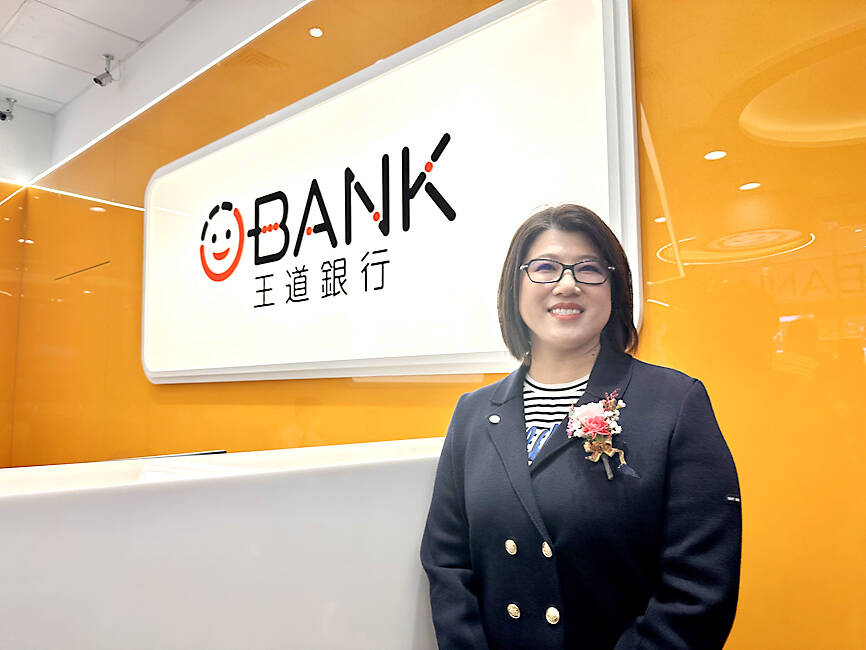Online bank O-Bank Co (王道商業銀行) is seeking to deepen customer relations rather than gain market share this year, in a bid to grow into a boutique lender and set itself apart from its peers, the lender said at an event in Taipei yesterday to mark its 25th anniversary.
“We are aiming to better utilize our resources by turning into a boutique bank that places more emphasis on our relationship with customers rather than wooing new ones indiscriminately,” O-Bank chairwoman Tina Lo (駱怡君) said.
To that end, the bank would work with customers in the pursuit of sustainability and fulfill its social responsibility, Lo said, adding that O-Bank is not in an advantageous position to compete with its peers with larger capitalizations in terms of expanding its assets or economic scale.

Photo: CNA
The lender would adopt a light-asset business model and adjust its portfolio dynamically to boost profits and advance digital transformation, O-Bank president Elton Lee (李芳遠) said.
RECORD EARNINGS
The lender reported that net income last year fell 41 percent year-on-year to NT$2.49 billion (US$77.8 million) as the acquisition of a capital leasing firm in 2022 steeply raised the comparison base for the year. Earnings per share were NT$0.87, it said.
Stripping out the merger, the bank achieved record-high earnings last year, thanks to higher fee income and trading gains in its corporate and retail banking businesses, Lo said.
Like its peers, O-Bank last year took advantage of the difference between Taiwan’s interest rates and those in the US by trading sizeable foreign exchange swaps, head of business strategy Joy Siew (蕭至佑) said.
Swap revenue would remain strong this year until the US Federal Reserve lowers interest rates, Siew said, adding that lower interest rates in the US would boost the value of the bank’s US dollar-denominated assets.
OVERSEAS EXPANSION
O-Bank is also on the lookout for expansion opportunities abroad, after its Hong Kong branch generated impressive profits last year and in the first two months of this year, Lee said.
The lender plans to set up a representative office in Sydney, open a venture capital unit in Singapore and create a leasing affiliate in Thailand, he said.
Overseas expansions would allow the lender to better serve its customers’ global wealth management needs, he added.

CHIP WAR: Tariffs on Taiwanese chips would prompt companies to move their factories, but not necessarily to the US, unleashing a ‘global cross-sector tariff war’ US President Donald Trump would “shoot himself in the foot” if he follows through on his recent pledge to impose higher tariffs on Taiwanese and other foreign semiconductors entering the US, analysts said. Trump’s plans to raise tariffs on chips manufactured in Taiwan to as high as 100 percent would backfire, macroeconomist Henry Wu (吳嘉隆) said. He would “shoot himself in the foot,” Wu said on Saturday, as such economic measures would lead Taiwanese chip suppliers to pass on additional costs to their US clients and consumers, and ultimately cause another wave of inflation. Trump has claimed that Taiwan took up to

A start-up in Mexico is trying to help get a handle on one coastal city’s plastic waste problem by converting it into gasoline, diesel and other fuels. With less than 10 percent of the world’s plastics being recycled, Petgas’ idea is that rather than letting discarded plastic become waste, it can become productive again as fuel. Petgas developed a machine in the port city of Boca del Rio that uses pyrolysis, a thermodynamic process that heats plastics in the absence of oxygen, breaking it down to produce gasoline, diesel, kerosene, paraffin and coke. Petgas chief technology officer Carlos Parraguirre Diaz said that in

Japan intends to closely monitor the impact on its currency of US President Donald Trump’s new tariffs and is worried about the international fallout from the trade imposts, Japanese Minister of Finance Katsunobu Kato said. “We need to carefully see how the exchange rate and other factors will be affected and what form US monetary policy will take in the future,” Kato said yesterday in an interview with Fuji Television. Japan is very concerned about how the tariffs might impact the global economy, he added. Kato spoke as nations and firms brace for potential repercussions after Trump unleashed the first salvo of

SUBSIDIES: The nominee for commerce secretary indicated the Trump administration wants to put its stamp on the plan, but not unravel it entirely US President Donald Trump’s pick to lead the agency in charge of a US$52 billion semiconductor subsidy program declined to give it unqualified support, raising questions about the disbursement of funds to companies like Intel Corp and Taiwan Semiconductor Manufacturing Co (台積電). “I can’t say that I can honor something I haven’t read,” Howard Lutnick, Trump’s nominee for commerce secretary, said of the binding CHIPS and Science Act awards in a confirmation hearing on Wednesday. “To the extent monies have been disbursed, I would commit to rigorously enforcing documents that have been signed by those companies to make sure we get